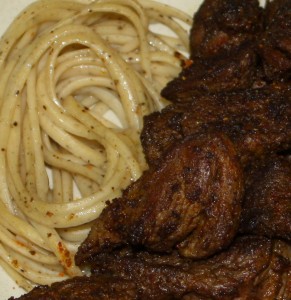Alice the Cook now has a marketplace on Facebook. If you have been interested in wanting to purchase a cookbook or one of her house made spice blends, visit http://on.fb.me/wC71Z9 and see what is being offered. New items will be added occasionally.

Cooking it Old School
The tales of love and romance are not a modern one. The earliest tales of romantic work can be traced to the Acritic songs from the Byzantium Empire. These songs were introduced to the French and Italian knights during the occupation after the 4th crusade and influenced their songs and stories. Similar traditions existed in Northern Europe and were in the form of great epic sagas and took place in exotic locations, usually having mythological elements and dangerous quests.
The earliest medieval romances dealt heavily with themes from folklore, which diminished over time. During the early 13th century romances were increasingly written as prose. As these romances gained popular favor, clerical critics of the late middle ages thought that romances were harmful worldly distractions from more religious or moral works. By the 17th century, many secular readers would agree with the religious leaders, as they felt romantic stories were trite and childish.
Alice the Cook here:
I am planning out my 2012 education season and I am looking for new opportunities. I currently perform at the Siouxland Renaissance Festivals in Sioux Falls, SD and the Minnesota Renaissance Festival in Shakopee, MN. In past years, I have also performed in Wisconsin and Iowa, and have provided various lectures to college and high schools as well a history enthusiasts.
If you know an organization that would like to hiring me to come out do perform shows or education, please let me know. You can send me a message by contacting me or my web designer through this site.
Thank you!
Alice the Cook
One of my favorite grains is barley. Fairly versatile, I can use it for breakfast, lunch or dinner. Eating sparingly and not overdoing it, barley can provide a tasty addition to any meal. In the case of the recipe below, the Beef Barley Soup is an old world recipe. If you do not care for the taste of turnips and parsnips, feel free to substitute other vegetables. I’ve heard green beans and peas make a wonderful addition. The dish is perfect for the cold weather of winter.
Growing up and attending modern schools, I heard the story about how Marco Polo brought pasta to Europe from the Far East. In fact, pasta was already established in southern Europe by the time Marco Polo began his journey along the Silk Road.
What I later learned was that products similar to pasta existed during the 1st century AD (the Etrusco Roman era). Made from durum wheat and water, “lagane” was very similar to modern lasagna. However, instead of being boiled, it was cooked in an oven along with chickpeas and spices.
Conquered cultures have often adopted languages, foods, sciences, and arts from invading cultures. The Arab invasions of the 8th century were no exception and impacted much of the culinary cuisines along the Mediterranean Sea and this includes what we now know as pasta.
Modern pasta is usually served with a sauce that is tomato-, vegetable-, seafood-, meat- or cream-based. But that was not so in the early versions of pasta. The Arab version of pasta contained cinnamon, clove, dried fruit like figs and raisins and it tasted both semi-sweet and semi-spicy. As time went on, invaded cultures began changing this recipe to fit their own ideals and tastes. The exotic spices were removed as people began adding their own items to the dish – vegetables, calamari (squid), fish, pork, and chicken. Sauces were developed when cooking the aforementioned items in olive oil or butter, with wine and, once reduced (cooked-down), they were added to the pasta.